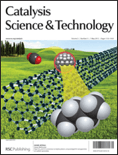
Catalysis Science & Technology
metrics 2024
Unleashing Potential in Catalytic Processes
Introduction
Catalysis Science & Technology is a leading journal published by the Royal Society of Chemistry, dedicated to advancing the field of catalysis through high-quality research and innovation. Established in 2011, this journal serves as a vital platform for researchers, professionals, and students interested in the latest developments in chemical engineering and catalytic processes. With an impressive Q2 ranking in Catalysis for 2023, the journal is recognized for its significant contributions to the discipline, evidenced by its respectable Scopus Rank of #21 out of 68 in the category and a 69th percentile standing. The journal is committed to disseminating original research that enhances our understanding of catalysis, facilitating knowledge exchange and collaboration within the scientific community. Even without Open Access, Catalysis Science & Technology remains pivotal in shaping innovations that drive forward both academic inquiry and industrial applications, making it an essential resource for anyone involved in this dynamic field.
Metrics 2024
 1.05
1.05 4.40
4.40 4.70
4.70 145
145Metrics History
Rank 2024
Scopus
IF (Web Of Science)
JCI (Web Of Science)
Quartile History
Similar Journals

International Journal of Chemical Engineering
Empowering global collaboration in chemical sciences.International Journal of Chemical Engineering is a leading peer-reviewed journal published by HINDAWI LTD, dedicated to advancing the field of chemical engineering through innovative research and practical applications. With an impact factor that places it in the Q2 category of Chemical Engineering (miscellaneous), this journal has established itself as a significant resource for researchers and professionals alike, particularly those interested in general chemical engineering topics. Since its transition to Open Access in 2008, the journal has ensured that critical scientific knowledge remains accessible to a global audience, fostering collaboration and interdisciplinary research. With coverage from 2009 to 2024, it continues to be an essential platform for disseminating cutting-edge findings, methodologies, and discussions that shape the future of chemical engineering. For more information, visit their website or access the latest issue directly to explore groundbreaking studies and insights.
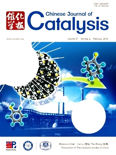
Chinese Journal of Catalysis
Transforming Ideas into Solutions in the World of CatalysisWelcome to the Chinese Journal of Catalysis, a prestigious publication dedicated to advancing the field of catalysis. Published by Elsevier, this journal showcases groundbreaking research and developments in the chemistry of catalysis, emphasizing applications that address global challenges in energy, environment, and sustainability. Since its inception in 1996, the journal has gained recognition, achieving a remarkable impact factor and ranking in the top quartile (Q1) of both Catalysis and Chemistry disciplines as of 2023. With a Scopus ranking of #5 in Catalysis and #14 in General Chemistry, it serves as a vital resource for academia and industry professionals alike. Through its rigorous peer-review process, the journal disseminates high-quality research that not only fosters collaboration among scientists but also encourages innovation. Access to the journal is available through institutional subscriptions, ensuring wide-reaching dissemination of critical findings. Positioned within the vibrant research community in China and beyond, the Chinese Journal of Catalysis plays a pivotal role in shaping the future of catalytic science.
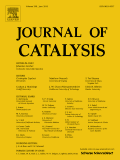
JOURNAL OF CATALYSIS
Fostering Collaboration in Catalytic ResearchJOURNAL OF CATALYSIS, published by Academic Press Inc, Elsevier Science, is a premier peer-reviewed journal that has been at the forefront of research in catalysis since its inception in 1962. With an impressive impact factor and ranking in the top quartiles of both catalysis and physical and theoretical chemistry, the journal is highly regarded, currently holding the distinction of Q1 in both fields. The journal serves as a critical platform for disseminating groundbreaking research, innovative methodologies, and theoretical advancements, making it essential reading for researchers, professionals, and students alike. Although it does not operate under an open-access model, its robust content is accessible through institutional subscriptions, ensuring that significant findings in catalysis and related fields reach a wide audience. With convergence years extending to 2024, JOURNAL OF CATALYSIS continues to shape the discourse in catalysis and chemical engineering, encouraging scholarly exchange and collaboration worldwide.

Chem Catalysis
Advancing the frontiers of catalysis science.Chem Catalysis is a leading academic journal published by CELL PRESS, specializing in the diverse and dynamic field of chemistry. Since its inception in 2021, this open-access journal has rapidly ascended to prominence, holding Q1 quartile rankings in prestigious categories including Chemistry (Miscellaneous), Organic Chemistry, and Physical and Theoretical Chemistry. With its Scopus rankings placing it in the top tiers—Rank #14 in Organic Chemistry and Rank #12 in Miscellaneous Chemistry—Chem Catalysis serves as a vital platform for disseminating innovative research and catalysis science. Researchers and professionals seeking to stay abreast of cutting-edge developments will find this journal indispensable for advancing their knowledge and contributions to the field. Located in Cambridge, Massachusetts, Chem Catalysis is committed to fostering collaboration and innovation in the chemical sciences, paving the way for breakthroughs that address global challenges.
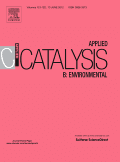
Applied Catalysis B-Environment and Energy
Driving innovation at the intersection of catalysis and environmental science.Applied Catalysis B-Environment and Energy, published by Elsevier, is a leading journal in the fields of catalysis, environmental science, and process chemistry, with an impressive impact factor that reflects its significance in advancing research and innovation. Established in 1992, this esteemed journal has earned a prestigious status as evidenced by its 2023 category quartiles—ranking in the Q1 category for Catalysis, Environmental Science, and Process Chemistry and Technology. With consistently high rankings in the Scopus database, it holds a remarkable position as #1 in General Environmental Science and #2 in both Process Chemistry and Catalysis, showcasing its profound impact on the respective fields. The journal’s scope encompasses both theoretical and practical research, targeting the pivotal developments in catalysis that promote sustainable practices and energy efficiency. Researchers, professionals, and students alike will find invaluable insights and cutting-edge studies published within its pages, making it an essential resource for those invested in pioneering advancements for a greener, more energy-efficient future.

Reaction Kinetics Mechanisms and Catalysis
Pioneering Research in Kinetics and CatalysisReaction Kinetics Mechanisms and Catalysis is an esteemed academic journal published by SPRINGER, specializing in the fields of catalysis and physical and theoretical chemistry. With ISSN 1878-5190 and E-ISSN 1878-5204, this journal serves as a crucial platform for researchers and professionals to disseminate and engage with cutting-edge findings in reaction kinetics, catalytic processes, and mechanistic insights. Operating under an open access model, the journal ensures broad accessibility to its content, enhancing its impact within the scientific community. As of 2023, it is positioned in the Q4 category in catalysis and Q3 in physical and theoretical chemistry, reflecting its growing influence, yet also its potential for further advancement. Aiming to foster collaborations and innovations, Reaction Kinetics Mechanisms and Catalysis is poised to continue shaping the discourse in its field, making it an essential read for researchers, students, and industry professionals alike.
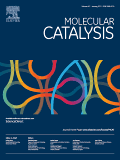
Molecular Catalysis
Exploring Innovations in Molecular CatalysisMolecular Catalysis, published by Elsevier in Netherlands, is a premier academic journal that explores the cutting-edge domain of catalytic science. With an impressive impact factor and classified in the top quartiles (Q2) in various fields such as Catalysis, Physical and Theoretical Chemistry, and Process Chemistry and Technology, this journal stands as a significant resource for researchers and professionals committed to advancing the understanding of catalysis processes. Since its inception in 2017, it has been pivotal in publishing high-quality, peer-reviewed research that addresses crucial challenges and innovations in molecular catalysis. The journal is fully Open Access, allowing unrestricted access to its articles, thus fostering a wider dissemination of knowledge. Recognized for its rigorous editorial standards, it features works that push the boundaries of current scientific understanding, making it an essential platform for students and academics alike to share and grow in their expertise.
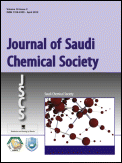
Journal of Saudi Chemical Society
Empowering Chemists Through Open Access Innovation.The Journal of Saudi Chemical Society, published by ELSEVIER, stands as a premier platform for advancing knowledge in the field of chemistry. Since its inception in 2009, this Open Access journal has garnered significant attention, securing a prestigious Q1 ranking in the Chemistry (miscellaneous) category for 2023, reflecting its position among the top journals in the discipline. With an impressive Scopus ranking of #66 out of 408 in General Chemistry, this journal boasts a commendable 83rd percentile, underscoring its impact and relevance in the global research community. The journal aims to disseminate high-quality research articles, reviews, and case studies, fostering innovation and collaboration among chemists and allied professionals. By enabling widespread access to cutting-edge research, the Journal of Saudi Chemical Society plays a crucial role in supporting the educational and professional development of students, researchers, and practitioners alike, making it an essential resource for anyone invested in the dynamic field of chemistry.
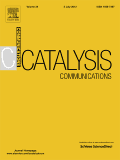
CATALYSIS COMMUNICATIONS
Transforming Research into Catalytic InnovationsCATALYSIS COMMUNICATIONS is a prestigious journal published by Elsevier, focusing on advancements in the field of catalysis, an essential component of chemical engineering and process technology. With an ISSN of 1566-7367 and an E-ISSN of 1873-3905, this journal is dedicated to the rapid publication of original research and innovative findings that drive progress in catalysis. Recognized for its quality, CATALYSIS COMMUNICATIONS holds a Q2 ranking within the categories of Catalysis, Chemistry (miscellaneous), and Process Chemistry and Technology as of 2023, positioning itself in the upper tier of scholarly publications in its field. The journal has made significant contributions to the scientific community since its inception in 2000, with ongoing research until 2024. While it currently operates without an open-access option, the platform ensures rigorous peer review, maintaining high standards for publication. By engaging with the latest research, CATALYSIS COMMUNICATIONS serves as a vital resource for researchers, professionals, and students, fostering innovation and collaboration in chemical sciences.

CATALYSIS SURVEYS FROM ASIA
Transforming Chemistry with Cutting-edge Catalysis SurveysCATALYSIS SURVEYS FROM ASIA, published by Springer/Plenum Publishers, is a vital resource in the ever-evolving field of catalysis and chemistry. With a dedication to publishing innovative research and reviews from 2002 to 2024, this journal serves as a platform for the dissemination of significant findings that enhance our understanding of catalytic processes and their applications. Although its current impact factor is not explicitly listed, the journal holds a commendable Q3 ranking in Catalysis and Q2 ranking in Miscellaneous Chemistry within the prestigious Scopus database, indicating its relevance and quality among its peers. Open access options ensure that a broader audience can benefit from the research published, fostering collaboration and advancement in the field. By bridging the gaps between academic research and practical applications, CATALYSIS SURVEYS FROM ASIA is indispensable for researchers, professionals, and students committed to pushing the boundaries of catalytic science and technology.